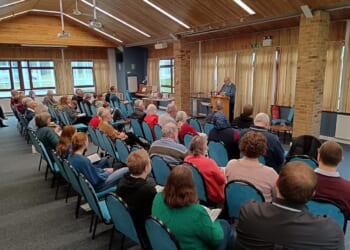Ta-Nehisi Coates, in his 2023 book, The Message, based on a 10-day West Bank trip, makes broad claims about Israel’s treatment of its Arab citizens. He focused his rhetoric on demonstrating that Israeli practices amount to apartheid by showing parallels to past South African and Jim Crow experiences. This enabled him to view Israel as engaging in “white supremacy.”
When it was pointed out that half of the Jewish population consists of nonwhite refugees from Arab countries and Ethiopia, Peter Beinart was quick to defend Coates: “In Israel, supremacy is based on Jewishness not (America’s) definition of whiteness. So Black and brown Jews — whatever discrimination they face — enjoy legal supremacy over Palestinians.”
What they ignore is the dramatic educational, occupational, and infrastructural advancements in Arab towns, villages, and neighborhoods. Gains were made under Netanyahu-led coalitions that employed substantial, sustained affirmative action programs. Today, there are Arab judges in the highest courts, senior administrators in the Israeli hospital system, and senior personnel in the police and other civil services. Indeed, the 2021 ruling coalition included an Arab party. While gaps remain large in many areas, it would be false to characterize them as evidence of a Jewish supremacist society.
The integration of Arab citizens is far greater in Israel than in nearby Arab countries. In Kuwait, 400,000 Palestinians, who had lived there for two generations, were expelled in the early 1990s when Yasir Arafat publicly supported the Iraqi invasion; a prime example of ethnic cleansing. In Lebanon, though they have lived there for more than three generations, Palestinians can only live in specified camps, and cannot work in almost all decent-paying professions; a textbook example of apartheid policies.
Even in Jordan, Palestinians, who represent at least half of the citizen population, are less integrated socially, politically, or professionally than their Israeli counterparts. A 2016 report concluded,
Although certain Palestinians have “made it” in Jordanian society, … as a whole, they suffer economic discrimination in areas such as appointments to positions in the Government and the military, in admittance to public universities, and in the granting of university scholarships …. … No Palestinians held any of the governorships in Jordan.
Moreover, Palestinians who came to Jordan from Gaza, estimated to now number 640,000, are not able to gain Jordanian citizenship. “Despite having lived in the country for decades — and even being born there — Jordan hasn’t granted them citizenship,” reported Shirin Jaafari. As a result, “Palestinians from Gaza are three times more likely to be living under the poverty line compared to other Palestinians in Jordan.”
But what of the Palestinians living in Gaza and the West Bank? For Gaza, the Palestinian historian Rashid Khalidi characterized the prewar situation there as an “open-air prison” as a result of Israel’s “full-blown siege.” He never mentions Egyptian restrictive policies, nor how Hamas could amass and divert material and manpower to build a tunnel system as large as the NYC subway system. Further inquiry finds that life in Gaza was not as bleak as Israel’s critics claim. Journalist Ari Yashar reported:
Western media has often been criticized by Israel for only on rare occasions presenting Gaza as anything other than an open-air prison suffering from Israeli blockades, but an unusual glimpse into the glamorous life of Gaza’s middle class made its way to light on Sunday.
Referencing a Washington Post report, Yashar begins by noting how under-reported the middle-class aspect of Gazan life is in Western media, commenting, “this is the Gaza outside the war photographer’s frame.”
“There is a parallel reality where the wafer-thin Palestinian middle class here is wooed by massage therapists, spin classes and private beach resorts,” continues the exposé, listing “a handful of new luxury-car dealerships, boutiques selling designer jeans and, coming soon to a hip downtown restaurant, ‘Sushi Nights.’” (RELATED: Palestinian Narratives Diverge From Reality)
As for the West Bank, the influx of Hamas and Islamic Jihad terrorists from Gaza in the last three years has led to deadly confrontations with both the IDF and settlers. However, critics ignore the experience there when Salam Fayyad was prime minister from 2007 through 2013.
Britannica wrote, “During his tenure as prime minister, Fayyad eschewed confrontation with Israel, pursuing a state-building agenda focused on developing government institutions and creating economic growth in the West Bank.” In a comprehensive study of the West Bank economy during much of Fayyad’s time in office, a Washington Institute study concluded,
Following the establishment of Prime Minister Salam Fayad’s government in 2007, the West Bank witnessed rapid GDP growth each year through 2010, including a 12 percent spike in 2008, 10 percent in 2009, and 8 percent in 2010. The IMF attributes this growth to donor aid, improved security conditions, decreased Israeli restrictions on movement, and private-sector confidence due to good management by the Palestinian Authority (PA).
Fayyad was forced out in 2013 due to the continued unhappiness with his approach by Palestinian activists. “Fatah has been critical of Fayyad for the last five years because he came to put things in order,” said Mahdi Abdul Hadi, director of the Palestinian Academic Society for the Study of International Affairs, an independent institute in East Jerusalem, noting that Fatah has over the years been notoriously divided and corrupt.
He lost the support of Palestinian Authority leader Abbas, who was unwilling to continue to present an image of constructive collaboration with Israel even when it benefited Palestinians. Thus, even in Gaza and the West Bank, Palestinian life has not been as bleak as pictured by Israel’s critics, and many of the problems there are the result of the adverse decisions of their (mis)leadership.
READ MORE from Robert Cherry:
Are Sugary Sodas Going to Disappear Under RFK Jr.’s Healthy Food Campaign?


![Jasmine Crockett Justifies Mass Illegal Immigration With Bizarre Argument [WATCH]](https://www.right2024.com/wp-content/uploads/2025/03/1742007023_Jasmine-Crockett-Justifies-Mass-Illegal-Immigration-With-Bizarre-Argument-WATCH-350x250.jpg)
![Red Sox Fan Makes the ‘Catch of the Day’ with Unconventional ‘Glove’ [WATCH]](https://www.right2024.com/wp-content/uploads/2025/04/Red-Sox-Fan-Makes-the-‘Catch-of-the-Day-with-350x250.jpg)
![NYC Tourist Helicopter Falls into Hudson River, Siemens Executive and Family Among Those Killed [WATCH]](https://www.right2024.com/wp-content/uploads/2025/04/NYC-Tourist-Helicopter-Falls-into-Hudson-River-Siemens-Executive-and-350x250.jpg)

![Biden Drops Racial Slur During First Public Speech Since Leaving Office [WATCH]](https://www.right2024.com/wp-content/uploads/2025/04/Biden-Drops-Racial-Slur-During-First-Public-Speech-Since-Leaving-350x250.jpg)


![Bartender Threatens Patron with Baseball Bat for Wearing a MAGA Hat [WATCH]](https://www.right2024.com/wp-content/uploads/2025/03/Bartender-Threatens-Patron-with-Baseball-Bat-for-Wearing-a-MAGA-350x250.jpg)
![Green Day’s Cringe Trump Diss Ends in Fire and Evacuation [WATCH]](https://www.right2024.com/wp-content/uploads/2025/04/Green-Days-Cringe-Trump-Diss-Ends-in-Fire-and-Evacuation-350x250.jpg)





